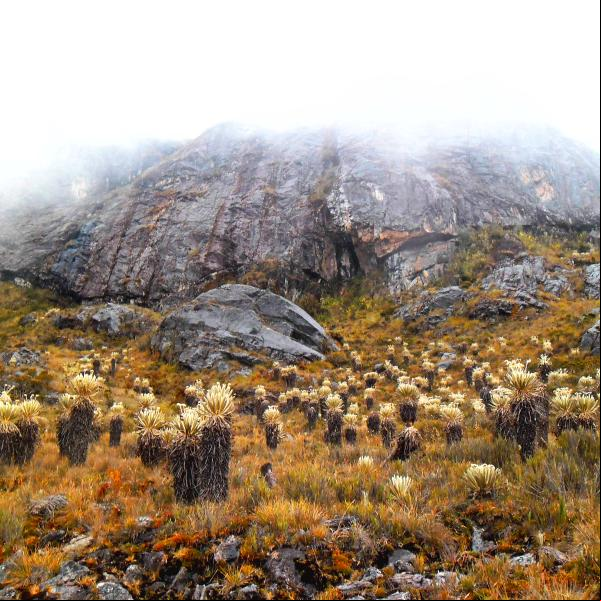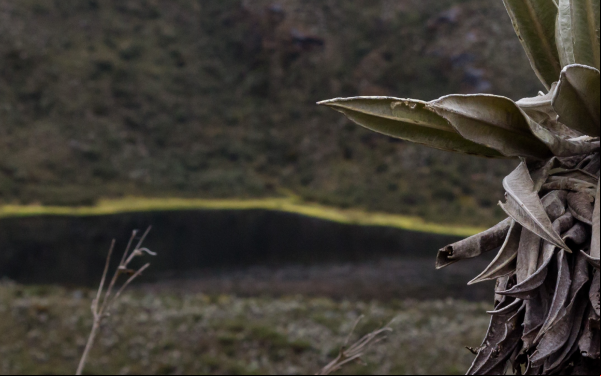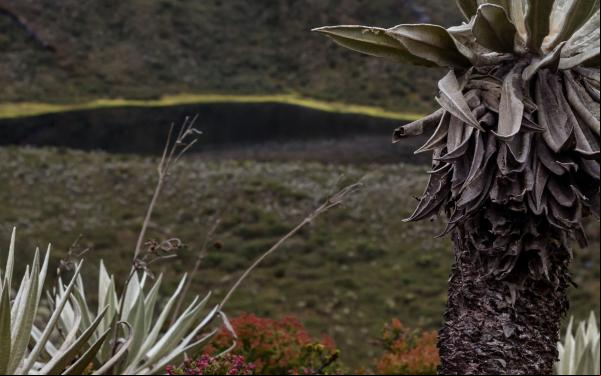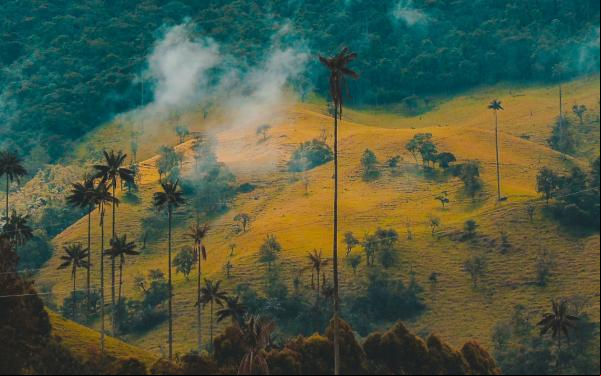
Project
Photo: Alberto Peña KayProtecting the Santurban Páramo from mining's damages
In the Andean region, high-altitude forests and wetlands called páramos capture water from fog and supply it to lowlands. In Colombia, nearly two million people rely on the Santurbán páramo for their freshwater supply.
Healthy páramos also capture large amounts of carbon, mitigating climate change, and provide refuge for hundreds of threatened species, including the iconic spectacled bear.
The land in and around the Santurbán páramo contains gold and other minerals. A Canadian corporation, Eco Oro minerals, wants to build a gold mine that would leak large amounts of cyanide and arsenic into the water coming from the páramo.
AIDA’s advocacy helped to convince the Colombian government to:
- Deny an environmental license for the Angostura mine in May 2011.
- Protect, in 2013, 76 percent of the Santurbán páramo from industrial activities—a much larger percentage than originally proposed
Together with our partners, AIDA advocated for the World Bank's divestment from the Angostura mining project, which we achieved in December 2016.
We also ed litigation that led Colombia’s highest court to reaffirm in February 2016 that mining in páramos is prohibited.
However, 24 percent of the Santurbán remains unprotected because it was not officially designated a páramo during the government's delimitation process, which was invalidated by a court system in November 2017 due to failure to consult with affected communities.
The government must now realize a new delimitation process in consultation with residents of the area. Meanwhile, the threats to Santurbán continue, with Eco Oro still angling to build its mine and another mining project seeking establishment nearby.
Partners:

Related projects
Latest News

Report of the International Mission to Colombia: Stop investor-state dispute settlement (ISDS)
In May 2023, a delegation of 13 representatives from social and environmental justice organisations from eight countries in the Americas and Europe visited Colombia to share experiences of struggles against the global investment protection regime. The mission also went to learn firsthand about the peoples and ecosystems being threatened by corporate lawsuits, as well as the environmental, social and cultural harms that transnational investments have already caused, particularly in the departments of La Guajira and Santander.The visit came in response to the significant rise in claims that transnational firms have made against the country in recent years, as highlighted in the Declaration “Recover Colombian Sovereignty in Defense of Water, Life and Territories”, signed by more than 280 organisations from 30 countries as well as 54 Colombian of Congress. In the last five years, Colombia has faced some of the highest number of arbitration claims in Latin America. In 2018 alone, Colombia received more claims than any other country in the world.Colombia’s pending claims currently total US$13.2 billion – equivalent to 13% of the nation’s budget for 2023 and nearly equal to what Colombia plans to spend on education this year.According to the State National Agency for Legal Defense, as of March 2023, 14 arbitration processes were underway with eight more in the pre-arbitration stage. Colombia’s pending claims currently total US$13.2 billion (52 trillion Colombian pesos as of August 2023), although in three cases the amount claimed is not public. This is equivalent to 13% of the nation’s budget for 2023 and nearly equal to what Colombia plans to spend on education this year.The bulk of investors that have brought arbitration cases are involved in the extractive industries, especially mining.We witnessed how this system enables corporate impunity and threatens the realisation and defence of Colombians’ fundamental human and environmental rights. We also observed how this system interferes with judicial independence, environmental regulation, and national sovereignty. Read and the report
Read more
International Arbitration Tribunal rules in favour of a Canadian company and puts foreign investment above Colombia's legitimate right to protect Santurbán
Bucaramanga, Bogotá, Washington, Ottawa. National and international civil society organizations are widely rejecting the decision made by the International Centre for Settlement of Investment Disputes (ICSID) on September 10 in the case of Eco Oro v. Colombia, for at least three reasons: we consider that (i) it is inconsistent and reflects a profound ignorance of the socio-environmental complexity of the case; (ii) it is the result of an unfair and widely discretionary investment arbitration system that allows for arbitrary decisions made by those who oversee these cases and, (iii) increases the risk of further arbitrations being brought against the State of Colombia at the ICSID. ICSID is one of the institutions responsible for resolving disputes between States and international investors — in this case, within the context of the Canada-Colombia Free Trade Agreement. In the case of Eco Oro v. Colombia, the ICSID Tribunal concluded that, although the protection measures of the páramos adopted by Colombia were legitimate and did not constitute an expropriation of the rights of the Canadian company Eco Oro, its actions in the delimitation of the Páramo de Santurbán did violate the “minimum standard of treatment” to foreigners. The Tribunal has yet to decide on compensation for damages to Eco Oro and has asked both parties for more information to inform its decision. The Tribunal’s decision was the result of a process initiated by a supranational arbitration claim filed by the Canadian company Eco Oro against Colombia in 2016, which questioned the decisions made by the Colombian government to protect the páramos — the natural source of water for 70% of inhabitants. The Canadian investor [Eco Oro] intends to construct the Angostura gold mine in the Santurbán páramo, located in the northeast of the country. An inconsistent decision that ignores the socio-environmental complexities of the case. The majority of the Tribunal held that the decisions made by the Colombian government were in accordance with Colombian national law and were made with the legitimate aim of protecting the environment. In addition, the Tribunal recognized that the páramos are being threatened by both human intervention and climate change and that the possibility of their recovery from mining activities is very low, which is why it is necessary to protect them. As a result, the Tribunal rejected Eco Oro’s argument that the precautionary principle was not applicable, and pointed out that the Santurbán case was an example where it was, in fact, relevant. This was the grounds for rejecting one of Eco Oro’s claims that its rights had been indirectly expropriated by the State of Colombia. On the contrary, the Tribunal found that the measures adopted by the country were a legitimate exercise in environmental protection. However, when examining a second claim, the Tribunal explained that the inconsistency, hesitation and inaction of the State of Colombia in the delimitation of the Santurbán páramo had thwarted Eco Oro's investment expectations without any “apparent legitimate justification,” and had therefore not granted the investor "fair and equitable treatment" in accordance with the "minimum standard of treatment" for foreigners. This last ruling of the Tribunal is inconsistent. It ignores the socio-environmental complexity of the case and the challenges of materializing the right to environmental participation within the process of delimitation of the páramo. Although the decision recognizes that the delimitation involves managing widely disparate interests throughout the process, in the end — in a ruling far removed from the reality of Santurbán and its communities — the Tribunal took this process lightly, dismissing its complexities, and appears to have not taken it as legitimate and sufficient justification. An unpredictable, limiting and unfair arbitration system. "The Tribunal's decisions are not predictable, since decisions in one case do not bind future rulings on environmental issues. There is no precedent set, as traditionally understood in the system. The breadth of the clauses and the arbitrators' freedom of interpretation are excessive, which is problematic not only for Colombia but for all countries in the region," said Yeny Rodriguez, a lawyer with the Interamerican Association for Environmental Defense (AIDA). This decision allows mining investment to prevail over the Colombian State's obligation to protect the environment and the water of Colombians. We question the fact that the Tribunal has made its decision but has not judged the lack of due diligence by the Canadian company who knew from the beginning that its mining project overlapped with a páramo zone — a sensitive ecosystem protected by national law. This case demonstrates the arbitrary and overreaching nature of the supranational arbitration system, and the way in which it disciplines and punishes the governments of the Global South. It’s worth ing that in February 2019, the Tribunal rejected the possible participation of the Santurbán Committee in the process. Uncertainty for Colombia. Carla García Zendejas, Director of the People, Land and Resources Program of the Center for International Environmental Law (CIEL) stated, "The legal uncertainty that the supranational investment arbitration system represents for Colombia is enormous. The high levels of arbitrariness that characterizes the system leads to penalizing States for any circumstance in which expected profits are affected. And this is especially critical for Colombia, as there are other lawsuits against the country resulting from extractive projects linked to Santurbán and other fragile ecosystems. This could mean a domino effect of lawsuits and heavy penalties against Colombians." Two other lawsuits are currently underway before ICSID against the country by Canadian mining companies — Red Eagle Exploration and Galway Gold — for measures taken to protect the Santurbán páramo. There are also other lawsuits filed by Cosigo Resources, South32 Investments Limited, Gran Colombia Gold, Glencore International and Anglo American in connection to other extractive projects. We call on the Colombian State to denounce the free trade agreements and bilateral investment protection agreements to which it is party and to refrain from g such instruments in the future. It is for these reasons above that today the Comité para la Defensa del Agua y el Páramo de Santurbán (Committee for the Defense of Water and the Páramo of Santurbán) is holding a day of protest in front of the Canadian Embassy in Bogotá, demanding that ICSID respect their legitimate fight for the defense of water, Santurbán and the páramos of Colombia. Likewise, we are also in front of Congress, demanding that the Investment Protection Agreements with the United Arab Emirates-Minesa be rejected. press s Comité para la Defensa del Agua y el Páramo de Santurbán, [email protected], +57 3012080622 Carla García Zendejas, Center for International Environmental Law (CIEL), [email protected], +1 202 374 2550 Yeny Rodríguez Junco, Interamerican Association for Environmental Defense (AIDA), [email protected], +57 3107787601 Jamie Kneen, MiningWatch Canada, [email protected], +1(613) 761-2273 Manuel Pérez Rocha, Institute for Policy Studies, [email protected], +1 240 838 6623
Read more
Colombia: Holding virtual hearings violates communities' right to participation
In the context of the pandemic, and since the beginning of Colombia's obligatory isolation, businessmen have asked the Colombian government to "simplify environmental procedures." On April 3, 25 entrepreneurs sent a letter to President Iván Duque asking for the simplification of processes including prior consultation, environmental licenses and royalities. One of the first measures undertaken was the attempt to simplify the prior consultation, proposing to make it virtual. In response, indigenous communities and the Ombudsman's Office requested that the Ministry of the Interior respect human rights and reverse the measure, which it did. However, the quest to change the way consultations are conducted continues. At the request of the Ministry of the Environment, the National Environmental Licensing Authority (ANLA) is promoting several virtual environmental hearings, even proposing they be held on radio and digital platforms such as Facebook and YouTube. These are hearings to address key environmental issues in the country. The problem is that communication on these platforms is unilateral, denounced the organization DeJusticia, thus eliminating the possibility of discussing technical issues, and presenting an obstacle for those with limited access to the Internet. On April 13, 2020, ANLA issued Resolution 642, which opened the way for virtual participation processes. Days later, the licensing authority scheduled a virtual hearing to discuss a very important issue for the region: the return of aerial spraying with glyphosate, a toxic herbicide. The hearing, scheduled for May 27, was intended to address the modification of the glyphosate environmental management plan. But, thanks to a legal action, on May 18 a judge from the department of Nariño suspended the hearing. As evidenced, there exists an ongoing intention to carry out similar proposals during the pandemic. Many have been halted by the early warnings of citizens, judicial actions or statements by control authorities. On 20 May, the istrative Court of Santander ordered the Ministry of the Environment to plan virtual working groups. It has also called for a virtual public hearing on the Santurbán páramo, where a mega-mining project threatens to harm this strategic ecosystem, which is vital for local water supply and the mitigation of the climate crisis. Holding virtual hearings implies a damage to the rural, indigenous and urban communities affected by a project, and to Colombian society in general. In addition to being in the midst of the worst crisis in recent history, these communities lack access to the internet and the basic necessities that could guarantee their virtual participation. In Colombia, and across the region, the rights of access to information, justice and participation are among the most violated. We must stand at high alert so that the pandemic does not become an excuse to continue abusing them. All remaining proposed virtual proceedings must be immediately suspended, until there exists guarantees for the due exercise of the right to participation and the exercise of national and international oversight in these matters.
Read more